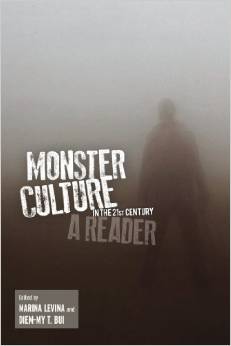 Fembot’s Books Aren’t Dead (BAD) interview for August 2014 is now uploaded on the Fembot website. In this month’s interview Mark McCarthy (doctoral candidate at University of South Florida) talks with Marina Levina (assistant professor, University of Memphis) and Diem-My Bui (clinical assistant professor, University of Illinois-Chicago), editors of Monster Culture in the 21st Century: A Reader (Bloomsbury Academic, 2013). You can listen to this interview at: http://fembotcollective.org/blog/2014/08/01/books-arent-dead-monster-culture-in-the-21st-century-a-reader/
Fembot’s Books Aren’t Dead (BAD) interview for August 2014 is now uploaded on the Fembot website. In this month’s interview Mark McCarthy (doctoral candidate at University of South Florida) talks with Marina Levina (assistant professor, University of Memphis) and Diem-My Bui (clinical assistant professor, University of Illinois-Chicago), editors of Monster Culture in the 21st Century: A Reader (Bloomsbury Academic, 2013). You can listen to this interview at: http://fembotcollective.org/blog/2014/08/01/books-arent-dead-monster-culture-in-the-21st-century-a-reader/
About Monster Culture in the 21st Century (from Bloomsbury Publishing Website):
In the past decade, our rapidly changing world faced terrorism, global epidemics, economic and social strife, new communication technologies, immigration, and climate change to name a few. These fears and tensions reflect an evermore-interconnected global environment where increased mobility of people, technologies, and disease have produced great social, political, and economical uncertainty.
The essays in this collection examine how monstrosity has been used to manage these rising fears and tensions. Analyzing popular films and televisions shows, such as True Blood, Twilight, Paranormal Activity, District 9, Battlestar Galactica, and Avatar, it argues that monstrous narratives of the past decade have become omnipresent specifically because they represent collective social anxieties over resisting and embracing change in the 21st century.
The first comprehensive text that uses monstrosity not just as a metaphor for change, but rather a necessary condition through which change is lived and experienced in the 21st century, this approach introduces a different perspective toward the study of monstrosity in culture.
About the Editors:
Marina Levina is an assistant professor at the Department of Communication at the University of Memphis. She received a PhD in Communication from the Institute of Communication Research at the University of Illinois at Urbana-Champaign. Her research areas are critical cultural studies of science, technology and medicine, visual culture, and media studies. She has written on the topics of social media and health information technologies, personal genomics, materiality in digital media, and visual culture’s engagement with scientific and medical difference. She is an avid fan of monster and horror narratives and has written on critical meaning of monsters, and especially their connection to current scientific discourse. She is the first editor of Monster Culture in the 21st Century: A Reader (with Diem-my Bui, Bloomsbury Academic Press, 2013) and Post-Global Network and Everyday Life (with Grant Kien, Peter Lang, 2013). Recently she authored a book titled Pandemics in the Media (forthcoming from Peter Lang Press in 2014), which looks at non-fictional and fictional media pandemic narratives as a site for discursive management and classification of global disease crises.
Diem-My is a clinical assistant professor in the Department of Communication at the University of Illinois, Chicago. Her research interests include transnational feminist media studies, critical cultural studies, ethnic studies, popular culture, and film. She focuses on cultural production, cultural memory, and embodiments of difference in racialized and sexualized representations in popular culture. She is the author of essays on popular culture and media, Vietnamese Americans, authoethnography, performativity, and war discourse published in journals and edited collections. Her book co-edited with Marina Levina, Monster Culture in the 21st Century: A Reader (2013, Continuum/Bloomsbury Academic), explores monster narratives as a response to a rapidly changing cultural, social, political, economic, and moral landscape in the 21st century. She has taught courses on communication, methods, Asian American studies, film and media studies, and popular culture.
About the Interviewer:
Mark McCarthy is a doctoral candidate in the Department of Communication at the University of South Florida. His M.L.A. work focused on the function of The Daily Show with Jon Stewart with respect to contemporary journalism. His current research focuses on contemporary fictional depictions of the apocalypse in film and television, specifically the raced and gendered logics of survival and the unique makeup of the post-millenial apocalypse tropes.
The podcast and the transcript for this interview (as well as BAD’s past interviews) will be available for download in the near future. BAD is Fembot’s series of monthly interviews with feminist authors of recent books on media, science, and technology. For those who are interested in participating in the ongoing BAD project please contact the BAD editor, Hye Jin Lee (hyejinjlee(at)gmail.com), or Carol Stabile (cstabile(at)uoregon.edu).

